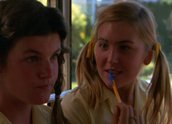


Puberty Blues (1981)
Synopsis
Debbie (Nell Schofield) and Sue (Jad Capelja) want to be accepted by the tough surfie chicks at their school, on Sydney’s southern beaches, but once in the group, they find it hard to conform. They’re expected to sit on the beach and watch their boyfriends surf, and they get dumped if they refuse sex. School is a drag, parents are impossible and the boys treat them like dirt. Deb knows there’s more to life than surfing, but she’s not sure what it is.
Curator’s notes
Puberty Blues was a blast of fresh, if impolite, air when it came out in 1981. Gabrielle Carey and Kathy Lette had based the book on their own recent experiences growing up on the beach near Cronulla, and young audiences could recognise a lot of their own experiences in the story of Debbie and Sue. Most importantly, the film didn’t try to smooth off the rough edges, or lecture its audience. Indeed, the rough edges were what it was about, as the two teenagers, desperate to be popular with the cool girls, are introduced to a world where sex is not connected to any idea of love, and equality is not even something the other girls dream of demanding.
Bruce Beresford was an unusual choice for director – but his ability to both observe and satirise Australian vernacular culture was well-established. He had mostly applied his acidic wit to depictions of the Australian male (in the Barry McKenzie movies) but Don’s Party was also about the Australian female, in whom he saw a certain sullen realism. Puberty Blues is a bit like an ocker movie for a younger generation, in which he depicts the first taste of humiliation and disappointments that are in store for them as they grow up. It’s basically a comedy, but a hard-edged one. Sue and Debbie are growing up with few role models. Indeed, the final scene, in which they buy a surfboard and teach themselves to surf, shows them becoming their own role models.
- Overview
- Curator’s notes
- Video 3 clips

- Principal credits
- Find a copy
- Make a comment
- Map
- Reviews 1



